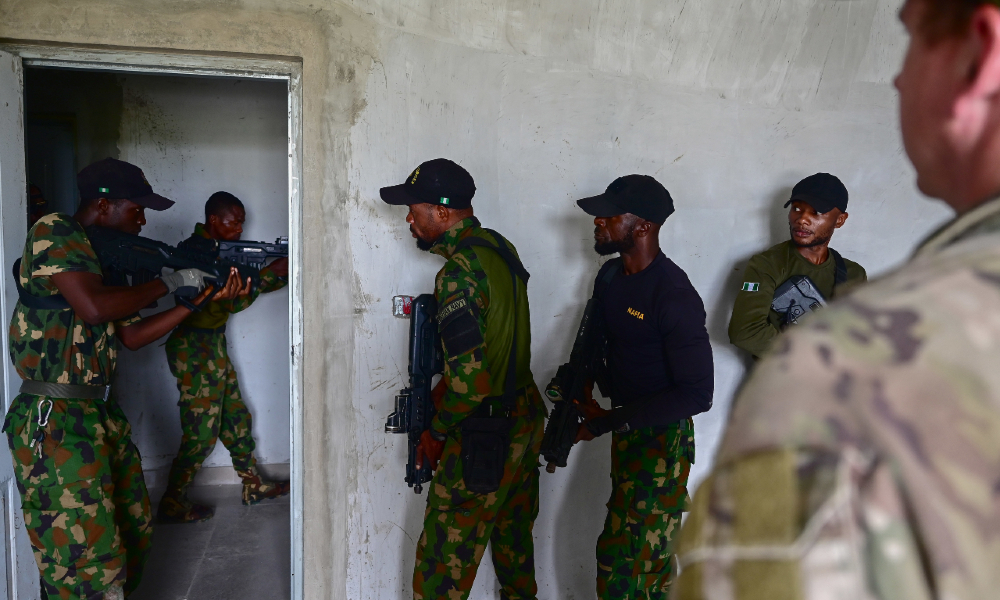What’s the Matter with (Visiting) Kansas?
Here’s a free suggestion for President Obama and to FBI Director James Comey, for that matter: Take a trip to Kansas.
Kansas? Whatever for?
To visit some meatpackers, of course.
Published by The Lawfare Institute
in Cooperation With

Here’s a free suggestion for President Obama and to FBI Director James Comey, for that matter: Take a trip to Kansas.
Kansas? Whatever for?
To visit some meatpackers, of course.
Last week, one of us wrote about three men who were charged with conspiring to use a weapon of mass destruction after law enforcement thwarted their attack on a group of Somali immigrants in Garden City, Kansas. Curtis Allen, Gavin Wright, and Patrick Stein were members of the self-appointed “Crusaders,” an anti-Muslim, anti-immigrant militia group. The men, who aspired to avenge the Orlando nightclub shooting, identified an apartment complex that was home to more than 100 Somalis, mostly there to work at meatpacking facilities, as their target. The complex also housed a mosque, and the men planned to park four cars, filled with explosives at each corner of the complex in order to inflict the maximum amount of casualties in an attack they hoped would become a complete “bloodbath.”
The government’s allegations in the complaint are chilling. All three men advocated killing children as young as one year old, referred to Muslims as “cockroaches” and promoted rape as a method of attack. They were allegedly timing their attack to take place the day after the presidential election.
The subjects, all now detained until their scheduled December 20th trial date, wanted to “wake people up,” and they may have succeeded in doing so—particularly the members of the Garden City community.
On October 15, the Saturday following the arrest, members of the community gathered in the parking lot of the targeted apartment complex to show their support for both the Somali community and law enforcement, according to the Kansas City Star. Members of the police department and FBI assured the residents that they were safe. The FBI had been monitoring the men for months, they said, and they would never have allowed the attack to take place.
Members of the Somali community, which makes up about two percent of Garden City, continued to express fear for their families’ safety, and reported mosque attendance being low following the reports of the arrests. Residents who had previously fled Somalia because of violence now said they didn’t feel safe in their own homes, but they also expressed gratitude towards the law enforcement officers who had thwarted the attack.
Even the mother of one of the defendants released a statement, expressing her thanks to law enforcement for stopping the plot. Christian leaders encouraged their congregations to attend the parking lot meeting in support of the Muslim community; members of the community could be seen holding up signs that read, “We love our Muslim neighbors” and “Thank you law enforcement.” The following day, according to the Garden City Telegram, a group of Somali women held a small demonstration of their own:
“Friday night, we didn’t sleep at all,” Farah said. “But yesterday, when we saw the police and we heard what they say, we were very happy.”
Farah was one of several Garden City residents holding signs expressing peace and love Sunday afternoon at an apartment complex on Mary Street that authorities say was the intended bombing target of three southwest Kansas men arrested Friday by federal agents.
Farah lives at the apartment complex, 312 W. Mary St., that is home to more than 100 others, mostly Somali Muslims. A one-bedroom apartment in the complex serves as a Muslim mosque.
. . .
Farah said upon hearing the news Friday, she and many other Somalis actually contemplated moving away from Garden City, but changed their minds after being assured by law enforcement officials at a gathering held at the complex Saturday that they were safe.
The overwhelming support for law enforcement in this case seems to us to present an opportunity for Obama to vividly illustrate several points his administration has struggled to make.
First off, it is particularly noteworthy that many of the techniques the FBI used in the this case are generally criticized as being tools used to target, instead of protect, Muslim communities in the United States. Not all FBI investigation are created equal. The investigative tools available to FBI case agents and analysts will differ depending on whether the case is classified as International Terrorism—for example, an ISIL-related case—or Domestic Terrorism, which includes the three militia members from Kansas. For example, the FBI can’t issue national security letters in the course of a domestic terrorism investigation, and in the case of electronic surveillance, will use a Title III warrant instead of FISA warrant.
However, the majority of tools are uniform across investigative classification, including tools used in the current case which have previously come under heavy scrutiny.
For example, the FBI initiated an investigation into the three “Crusaders” after a paid source began reporting on all three men. The source was a member of the Crusaders, attended meetings, and regularly recorded his phone calls with the subjects, in addition to wearing a body recorder during meetings. The FBI’s use of paid insider sources, particularly those involved in consensual recordings, has been contentious in the years since 9/11. For example, in 2011, the ACLU filed a federal class action lawsuit against the FBI alleging that the agency conducted “indiscriminate surveillance” on Muslims when using sources in mosques.
While that lawsuit was eventually dismissed, voices continued to raise concerns about the disproportionate effects of FBI investigations Muslim communities. Recently, the agency’s use of undercover agents in ISIL-related cases has also come under scrutiny. Critics argue that undercover employees are used too frequently and do more to entrap the subjects than to reveal true criminal intentions, plans, or capabilities.
Interestingly, in the current investigation, the source introduced an undercover FBI agent to one of the subjects under the ruse that the undercover agent could provide automatic weapons and components for explosive devices to the group. One of the defendants actually met with the undercover agent, who provided him with a firearm from the FBI lab in Quantico, Virginia. After a metric ton of ammunition was recovered from the defendants’ homes, it’s a little hard to argue that the subjects were nudged by the FBI into criminality. But this tactic too—FBI agents posing as operatives offering operation help—is one that has drawn criticism when used against Muslim terrorist extremists.
So the first point a visit to this community could bring out is that these are actually neutral tools that law enforcement uses not merely to investigate Muslim Americans but also to investigate those threatening Muslim Americans.
A second key point that this case illustrates is that there are good reasons to focus on “violent extremism” generally, rather than “radical Islam” in particular. Obama gets criticized a lot by the political Right for not being willing to finger the enemy as Islamic in character. And to be sure, many violent extremist movements today act in the name of Islam and seek to kill non-Muslims (and other Muslims). But not all. In this case, the would-be-victims are Muslim and the violent extremists act in the name of medieval Christianity. The law enforcement interest in both situations is the same: to protect people from the predations of violent extremism. In this sense too the case makes the argument that the approach is a neutral one.
Finally, there’s a third reason why a visit from Obama over the next couple of weeks would be significant: It’s a way of talking about Trump’s noxious vocabulary about immigration, refugees, and Islam without ever saying the man’s name. Here’s an Islamic community that came to this country feeling violence in a war-torn country. It lives and works peacefully and contributes to our society. It is menaced by violent extremists in the context of a political campaign that for more than year has openly advocated banning Muslims from entering the country.
What better way to rebuke this vocabulary than a presidential visit to a community that has responded to these outrages with signs thanking and supporting federal law enforcement?






